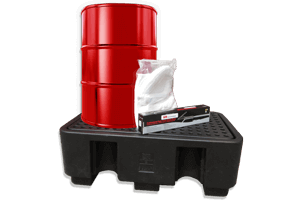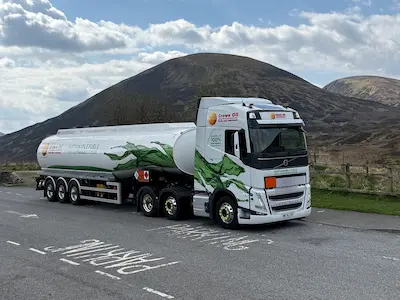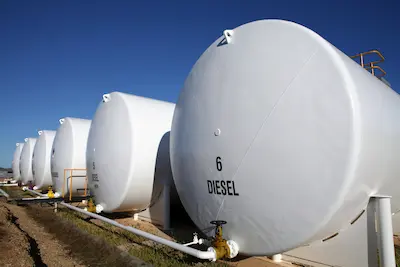Advice for preventing and dealing with oil storage leaks and spills
If you’ve ever been unfortunate enough to experience any sort of leak from your oil storage tank, you’ll know how devastating it can be to the area around where the leak occurred. Containing and stopping any form of oil leak as soon as possible is imperative to prevent contamination to the environment which could both be costly to rectify as well as the monetary value of the lost oil from your tank.
Although this guide does cover advice for domestic customers of home heating oil, the same advice is also important for dealing with all types of fuels, oils and lubricants which must be stopped, contained and eventually cleaned up to prevent further issues to environment. Preplanning and preparation is key to ensuring that you’re well prepared and ready for any situation you may face.
Not only is it important from both a monetary perspective from the cost of lost fuels and the expense of a potentially costly clear up. It’s also important to ensure anything you store at your premises, be it fuels, oils or lubricants are kept safe and secure to adhere to oil storage tank regulations. Quite often, leaks involving home heating oil tanks can be prevented through proper maintenance of your storage tank. For commercial customers, regular tank inspections can ensure that problems and issues are caught early before they become serious issues.
The impact of a home heating oil leak can vary from sudden to periodic and from minor to catastrophic. With domestic use, leaks are often found coming from the tank, the valves or the supply line, so if you’ve noticed an unexpected drop in your fuel level it’s worth checking that your heating system is not suffering from a leak.
As domestic heating oil tanks are commonly found outdoors, any leak has the potential to cause damage to the environment. It is therefore imperative that you deal with the leak quickly and correctly. Our 12-steps will help you solve your heating oil leak quickly and correctly.
Steps to take to solve a leaking oil tank
- Stop the flow at the source by turning the tap off.
- Aim to identify where the heating oil leak is and reduce the flow
- If spilt oil is on the ground, try to absorb this with sand (spill kits are available from Crown Oil)
- Prevent the flow to nearby buildings or watercourses.
- Identify whether the heating oil leak has travelled from your property and affected third-party land.
- Try to determine the amount of fuel lost from the tank by checking records of previous usage and receipts from fuel supplier.
- Notify your insurance provider as soon as possible as they will arrange for contractors to respond to the spill. Please note that they won’t cover tanks or pipes that have not been maintained properly.
- Contact your fuel supplier to request they uplift the remaining fuel as quickly as possible.
- If the heating oil leak has contaminated controlled waters such as streams ponds or lakes, contact the Environment Agency on 0330 123 1444.
- If the heating oil leak has damaged the building structure or the water supply has been tainted (tastes or smells of fuel), contact your local Environmental Health Officer.
- Ensure any repairs are made by an OFTEC registered engineer.
How to find a heating oil line leak
Leaks can occur at any point in your heating oil system. To locate the source of the leak, your best bet is to troubleshoot the system methodologically to ensure the leak isn’t occurring at multiple points:
Start with the tank itself and look for any signs of oil that has spilled on the ground. If you’re satisfied that there is no oil in the surrounding area, follow the pipeline, looking for any signs of oil on the heating line and/or on the ground.
Make your way to the boiler in this fashion to finally assess whether the leak isn’t happening from a valve in your furnace.
How to clean leaked heating oil
Spilt kerosene is damaging to the environment and needs to be cleaned immediately. If there’s only a small amount of oil that has spilled, you can use a spill kit to soak up all the oil. At Crown Oil, we supply a range of spill kits, to help you detain any leaks and spills safely and quickly.
However, if a large amount of heating oil has leaked into the environment, it’s important to contact a professional company as soon as possible who can clean up all remnants of oil safely and within environmental legislation. So, if you suspect a heating oil leak, call us today on 0330 123 1444, our team of engineers are available 24/7.
How to use an oil spill kit
Spill kits are simple to use. The first step is to confine the oil spill to one area. Then using the hydrophobic sandbags provided in the spill kit, cover the oil.
The sandbags will absorb the oil and prevent it from contaminating the environment. Leave these for a few minutes to let the bags soak up the oil. Once the sandbags are saturated, dispose of them using the bin provided in the kit.
When the spill is cleaned, it is essential you dispose of the oil-logged sandbags responsibly.
Repairing damaged oil tank or pipes
Whether it’s the storage tank or pipework that’s damaged, it’s essential that the faulty hardware gets replaced as early as possible to ensure the problem doesn’t get worse.
However tempted you may be to make DIY repairs even as a stopgap, we urge you to contact an OFTEC-accredited company to handle your repairs to prevent future emergencies.
Preventing heating oil leaks
Prevention is cheaper than a cure – so you’ll always want to ensure your oil-fired heating system is protected against wear and tear. It’s important to take any steps you can to ensure your oil tank is stored in a closed space on top of a concrete slab or tray to prevent potential heating oil spill soaking into the ground.
What causes heating oil leaks?
Despite anyone’s best efforts, wear and tear of an oil-fired system due to changes in temperature and humidity are usually the dominant cause of oil leaks in homes.
Environmental damage can cause cracks in storage tanks, pipes and valves due to oxidation, expansion and contraction due to seasonal temperature changes.
What are the dangers of heating oil spills
Heating oil spills are dangerous to the environment as it makes the water toxic to wildlife. If your heating oil tank is located outside and is leaking, oil clean up by remediation specialists is essential.
If the oil has spilt into controlled waters, such as streams, ponds, or lakes, contact the Environment Agency on 0330 107 1443 as a priority.
Clean up costs of a heating oil leak?
Depending on the size of the leak, the costs of cleaning up an oil spill in your home can be quite daunting, especially if remediation is required. For this reason, we urge you to check with your insurance company to make sure that you are covered.
Crown Oil can assist with domestic and commercial oil remediation – call 0330 123 1444 today.
More information is available on our distillate fuel storage, maintenance and recommendations page.







